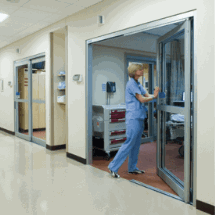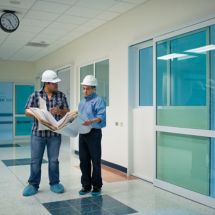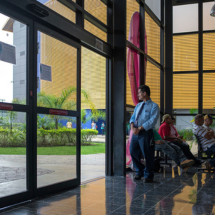Safety Automatic Door Due Diligence Checklist
December 27, 2018
Automatic doors are no longer just considered a convenient or even futuristic feature inspired by Sci-Fi films and TV. These mechanisms are now an essential part of buildings, especially when it comes to helping people with accessibility issues easily enter and exit buildings. But like any piece of hardware, automatic doors aren’t perfect and require both inspection and maintenance in order to continue to operate safely.
If you want to make sure your automatic sliding doors continue to be a helpful feature for your facility, rather than a hazard, follow these guidelines. This type of due diligence for automatic doors systems is valuable.
You should maintain an automatic door maintenance checklist, and one of the first things that should be on it is activation. The sensors are an essential part of automatic door inspections because if these don’t work correctly, the doors will be unreliable, possibly even dangerous. So, ensure that activation protocols are working as specified. Always test the performance threshold of your sensors, so you know when the activation is not working to its usual parameters.
Because doors are mechanical objects, your automatic door safety standards should include looking over the actual mechanical hardware itself. Are the door’s mechanisms in good condition? Do the parts need repair or replacement? Do you know how to judge the condition of these parts? Familiarize yourself with the essential parts of your automatic doors and find a good contractor you can rely on to perform inspections as well.
Your automatic door due diligence checklist should also include looking at the area around the door itself, as this plays a crucial role in safe entry and exit. Is the path clear and unobstructed? Is the mat molding secure and providing sufficient traction? The path you establish to your door plays a vital role in how well the door functions and how safely traffic can pass through.
Commercial automatic door inspection should also have some kind of maintenance plan. It’s not a good idea to wait until you see performance degrade—or stop entirely—before looking to see what’s wrong. Preventive maintenance is an integral part of making sure that problems never arise by eliminating potential problems before they can grow.
If you’re just in the planning stages of getting an automatic door, then some good automatic door due diligence includes researching the right door and manufacturer for your needs. Retail outlets may have one set of requirements for an automatic door, but a health clinic may have very different needs. Always tailor your automatic door selection to the type of activity your facility will most likely see.
Finally, a commercial automatic door inspection should be conducted every day or at least every week. It is an important part of any preventive maintenance plan. Establish a regular routine that tracks the level of performance you’re getting from your automatic doors. Once you know how your door is supposed to operate, it will be much easier during daily safety checks to establish when you see a drop in performance, and you’ll be able to act to address the issue.
If you want to make sure your automatic sliding doors continue to be a helpful feature for your facility, rather than a hazard, follow these guidelines. This type of due diligence for automatic doors systems is valuable.





